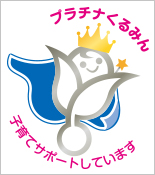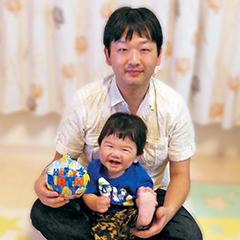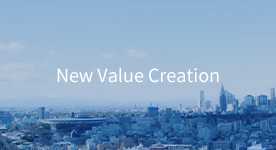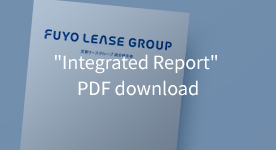Basic Approach
The Fuyo Lease Group believes that creating a work environment in which employees can be healthy, safe and can work with energy and enthusiasm leads to a more vital, productive organization. We are striving to build a better working environment where all employees can find their own optimal work-life balance and enhance the quality of both life and work.
In addition to providing support for childcare and nursing care, since fiscal 2014 we have been implementing work-style reforms across our corporate group and in fiscal 2020, we introduced hourly-based annual leave and established rules for telecommuting to allow for even more flexible work styles. In fiscal 2022, we took initiatives in response to the demands of the times, promoting measures such as the introduction of a flexible hours program.
In fiscal 2017, we formulated Next-Generation Training Support Action Plan: Stage 7 (April 2017-March 2022) with the aim of enabling each employee to independently and actively review workstyles tailored to their individual lifestyles, and with the aim of creating a work environment and corporate culture that enables employees to balance work and family while maintaining job satisfaction and a spirit of taking on challenges. Now that this action plan has finished, we will further advance its initiatives with the aim of achieving our numerical targets and promoting a variety of work-styles to employees through the active use of various programs, leading to the realization of a self-sustained work-life balance.
Description
-
Promoting independent and active working styles
-
Encouraging male employees to take a more active role in parenting
-
Reducing total working hours
-
Offering diverse career path options
Numerical targets (Fuyo Lease non-consolidated)
| FY2017 | FY2018 | FY2019 | FY2020 | FY2021 | FY2022 | FY2023 | FY2024 | FY2026 Target |
|
|---|---|---|---|---|---|---|---|---|---|
| Rate of taking annual paid leave | 68.0% | 68.4% | 66.3% | 72.0% | 82.3% | 93.5% | 93.3% | 92.8% | 90% or more |
| Rate of male employees who take childcare leave etc. | 90.0% | 90.5% | 90.5% | 78.6% | 110% | 100% | 108.3% | 100% | 100% or more |
| Rate of taking the +Friday system* | - | - | - | - | 89.4% | 89.0% | 88.7% | 90.8% | - |
-
*The percentage of people who took the +Friday system at least once a year among employees as of the fiscal year-end (excluding those on leave, retirees, and mid-career hires during the fiscal year). Excludes workers at seconded sites and overseas subsidiaries that do not have the +Friday system.
Main Programs and Benefits
As programs to support childcare and nursing care for our employees, etc., we have established the following to promote understanding in the workplace and the active utilization of these programs.
| Name | Program contents |
|---|---|
| Maternity leave | A program that allows female employees to take paid leave of six weeks before childbirth and eight weeks after childbirth. (In relevant legislation, companies are not required to provide pay during maternity leave, so this initiative goes beyond legal stipulations.) |
| Spousal childbirth leave | A program that allows male employees to take three days of paid leave when their spouses give birth. (In relevant legislation, companies are not required to provide spousal childbirth leave, so this initiative goes beyond legal stipulations.) |
| Parental leave | A program that allows employees raising children to take five days of paid leave (however, a maximum of ten days of leave can be taken if it is taken in conjunction with childbirth leave) |
| Childcare Leave | A program that allows employees to take leave when they need to take care of preschool children (five days per child per business year) |
| Nursing care leave | A program that allows employees to take up to five days of leave per business year for each family member who is in need of nursing care |
| Flexible work hours program | A program to allow for shortened working hours for employees until the end of their child's third year of elementary school |
| Flexible work hours | A system that allows employees to start work anytime between 7:00 and 11:00 and work for 7 hours and 20 minutes |
| Return-to-work program | A program that assists people who want to return to work after leaving due to reasons such as marriage, pregnancy, childbirth, childcare, transfer of spouse, or nursing a family member |
| Telework program | A program that allows employees who want to use teleworking may work from home or a location equivalent to home if they receive permission from their supervisor |
| Employee stock ownership program | A program that enables full employees of Fuyo General Lease Co., Ltd. to purchase and hold shares in the company and receive benefits including incentives and dividends |
Initiatives to Support Childcare
Since the Act on Advancement of Measures to Support Raising Next-Generation Children went into effect in 2005, we have been working to create a better job environment for working parents by developing a "general employer action plan" as required by the law.
As a result, we achieved our action plan based on the Act on Advancement of Measures to Support Raising Next-Generation Children. In addition, following fiscal 2007, fiscal 2009, fiscal 2011, fiscal 2013, and fiscal 2015, in fiscal 2017, we received our sixth "general business owner conforming to standards" certification from the Tokyo Labour Bureau, and obtained the six-star mark of the Next-Generation Certification (the Kurumin mark) from the Ministry of Health, Labour and Welfare as a company working to support balancing work and family life.
Also, in fiscal 2017, we received the special Platinum Kurumin certification, an accreditation that is given to companies that have achieved a higher level of commitment among other Kurumin-certified companies.
In fiscal 2018, we worked to transform mindsets by holding an Ikuboss Seminar, having management-level staff take part in the Ikuboss Declaration, and participating in the Ikuboss Corporate Alliance. In fiscal 2019, we revised a number of regulations to make it easier for male employees to take childcare leave, and in fiscal 2020, we made it mandatory for male employees to take childcare leave (in fiscal 2024, the rate of paid paternity leave was 100%). Going forward, we will continue to make efforts to actively promote the participation of male employees in childcare while also aiming to further increase the rate of paid paternity leave.

Platinum Kurumin mark
Employee's comment: Mitsuhiro Uekusa, DX and Marketing Strategy Division
"I used childcare-related programs, and now I'm putting a lot of effort into raising my child."
I took two special leaves of absence vacations, first taking spousal childbirth leave when my wife gave birth, and then taking childcare leave when she returned home after giving birth in her hometown. The company encourages male employees to take childcare leave, and thanks to the understanding of my superiors and colleagues, I was able to devote myself to childcare with peace of mind while on leave. There is also a program to receive childcare products as a gift to celebrate the birth of a new child, and this makes me feel like the company supports employees raising children. In the future, I would like to continue to take advantage of programs such as flexible hours to work efficiently while also valuing the time that I spend with my family.

I am doing my best to care for my firstchild with my wife.
Initiatives to Support Nursing Care
In 2024, we held a Seminar on Balancing Nursing care and Work to dispel concerns about nursing care, which is expected to affect many employees in the future. At the seminar, employees learned about balancing work and nursing care. We also provide various types of information on nursing care and support employees who are being confronted with nursing care.
Promoting Work-Style Reforms
Refresh Day
In fiscal 2023, we continued to hold Refresh Day (no overtime day) once a week. Employees are free to choose any day of the week as their Refresh Day.
+Friday (Plus Friday)
To encourage each individual employee to review their workstyle, from February 2017 we have introduced the +Friday program, which allows employees to select one Friday of each month to leave work after a half day. In fiscal 2024, 90.8% of our employees were users of the program, which helped promote a more comfortable working environment. At the same time, we aim to create an environment where employees’ diverse ideas are reflected in operations by encouraging each employee to increase their knowledge and experience outside the workplace.
Employee's comment: Yuko Hoshino, ICT Solution Business Division
"It's a good opportunity to separate work and private life."
I use the time freed up by +Friday as an opportunity to go and see a movie, a favorite pastime of mine, and to go out with my husband, who has days off on weekdays. In the past, I struggled with balancing work and housekeeping, but by being able to secure free time even once a month, I feel I can have some downtime and it also increases my motivation to work from the next week. In the future, I would like to take advantage of this program, not only for my hobbies but also for lessons on cultural activities.

I'm using the afternoon to refresh myself.
Flexible Hours Program (formerly: Staggered Hours Program)
We have established a new program that encourages a shift to an autonomous and active work-style by allowing employees to use their own discretion in managing time and work. Depending on their lifestyle, and not only for reasons such as childcare and nursing care, the Staggered Hours Program lets us select from among four work patterns that advance or postpone when we start and end work outside of the normal working hours. This, along with the Discretionary Labor Program, was introduced and implemented from May 2017. Starting from fiscal 2023, the staggered hours program was changed to the flexible hours program. Under this program, employees start work between the hours of 7:00 and 11:00, then work for seven hours and 20 minutes, offering even greater flexibility.
Telework Program
In April 2021, we introduced a telework program with the aim of enabling autonomous and active work styles. Employees who want to use teleworking may do so if they receive permission from their supervisor, enabling them to work autonomously and actively in a way that can be expected to raise productivity and make operations more efficient.
Increased paid leave take-up rate
We have been working to improve the paid leave take-up rate through measures such as establishing a system in fiscal 2011 that encourages taking consecutive days of leave in summer and winter and introducing the Five-day Consecutive Annual Leave system in fiscal 2016 with the aim of improving the rate at which career-track employees take leave. Furthermore, in fiscal year 2021, we started promoting 'bridge holidays' that increase the chances of taking four to five consecutive days off by taking leave on the one or two business days bracketed between a weekend and a national holiday, in order to achieve a balanced approach to work and time off.
As a result, we achieved a paid leave take-up rate of 92.8% in fiscal 2024 (Fuyo General Lease non-consolidated).
In our Medium-Term Management Plan Fuyo Shared Value 2026, are targeting a paid leave take-up rate of at least 90% (Fuyo General Lease non-consolidated) by fiscal 2026. We will work to achieve this target by continuing to raise awareness of taking annual paid leave in a planned manner.
Engagement
The Fuyo Lease Group defines engagement as "a relationship in which each employee links the growth of the company with his or her own growth, and contributes to their mutual growth." The Group measures indicators of engagement through employee opinion surveys and monitors trends in those indicators.
In fiscal 2024, the surveys were administered to 2,981 employees in total at 14 companies in Japan, and the response rate was 97.7%. The questions were divided into several sections, including workplace and job satisfaction, perceiving the significance of work, and work-life balance, and evaluations were given on a scale of one to five. After conducting the survey, we aggregate and analyze the responses by department and by gender, and use the results to expand our systems for improving on comfortable working environments and for personnel measures.
Results of employee opinion survey
| FY2018 | FY2019 | FY2020 | FY2021 | FY2022 | FY2023 | FY2024 | |
|---|---|---|---|---|---|---|---|
| Number and percentage of employees who answered the survey | Domestic 8 group companies, 1,490 employees | Domestic 10 group companies, 1,714 employees (97.7%) | Domestic 12 group companies, 2,096 employees (95.2%) | Domestic 12 group companies, 2,051 employees (94.0%) | Domestic 13 group companies, 2,575 employees (93.5%) | Domestic 14 group companies, 2,808 employees (96.7%) | Domestic 14 group companies, 2,911 employees (97.7%) |
| Job satisfaction | 87.3% | 85.8% | 85.4% | 85.9% | - | - | - |
| Percentage of improvement in engagement indicators* | - | - | - | 3.48 | 3.48 | 3.47 | 3.46 |
-
*The percentage of improvement in engagement indicators measures the average response value of eight indicators, including job satisfaction, value provided to society, and growth, as set forth in employee opinion surveys, covering 14 domestic companies among our main Group companies.










